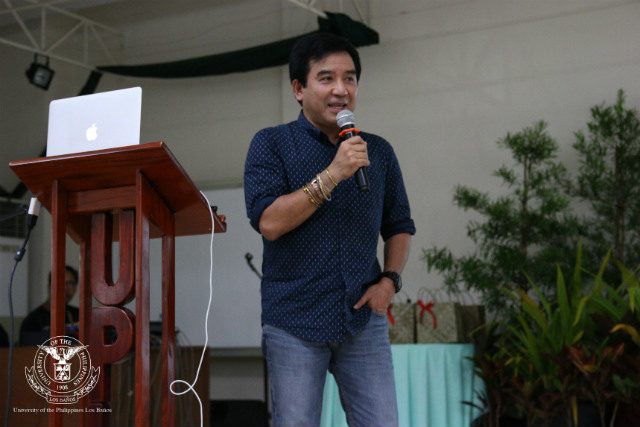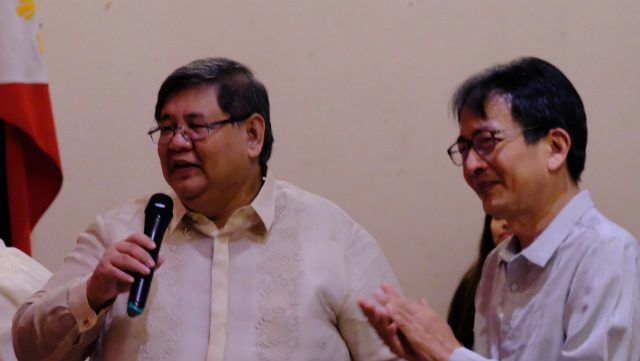SUMMARY
This is AI generated summarization, which may have errors. For context, always refer to the full article.

MANILA, Philippines – Over the years, the University of the Philippines has proven its role in nation-building and pushing for the strengthening of democratic institutions in the country.
To know UP is to understand, accept, and acknowledge that its timeless tradition of honor and excellence produces students and leaders who fight back against any form of oppression and abuse – be it in the form of anti-student policies or even excesses in government. (READ: TIMELINE: First Quarter Storm)
Starting Thursday, January 16, the UP Diliman (UPD) community is expected to scrutinize and engage in the selection process of its new chancellor. But the final decision is up to the Board of Regents – UP’s highest decision-making body.
According to Sean Thakur, Diliman’s Student Council chairperson, the role of a chancellor is very important as his stand on issues will greatly influence the actions of the university. He will, after all, take on the role for at least 3 years.
“Malaki ang influence ng chancellor dahil sa kanya magre-reflect kung ano ba ang ideals ng university (The influence of the chancellor is huge because he will reflect the ideals of the university),” he told Rappler. “We need someone who’s pro-people because UP will always be pro-people and pro-marginalized.”
Who are the two nominees? Get to know them below.

Dr Fidel Nemenzo
Fidel Nemenzo is UPD’s vice chancellor for Research and Development. A professor of Mathematics since the 1990s, Nemenzo’s areas of expertise include number theory, elliptic curves, and coding theory.
He graduated with a bachelor’s degree in Mathematics from UP in 1985 and pursued post-graduate studies in Sophia University in Tokyo, where he obtained his master’s and doctorate degrees.
Nemenzo served as president of the Southeast Asian Mathematical Society from 2010 to 2012, and the Mathematical Society of the Philippines from 2004 to 2010. He has held research and teaching posts in Singapore, Tokyo, Amsterdam, Munich, and Phnom Penh.
At present, Nemenzo serves as the convenor of the Data Science for Public Policy Program of the Center for Integrative Development Studies. He was also elected to the Governing Board of the National Research Council of the Philippines in 2019 and currently chairs its Mathematics Division.
Nemenzo is the son of former UP president and professor Francisco Nemenzo Jr.
He entered UP during the politically repressive Martial Law era and he became involved in student activism during his undergraduate years. In a speech in 2014, he said: “Needless to say, I acquired my education from both inside and outside the classrooms of UP.”
In his piece Mathematics and the Liberal Arts published in 2015, Nemenzo said that UP does not teach students to be neutral.
“They should look at all sides of an issue but must take a stand when the situation requires a stand,” he wrote. “UP should offer choices but has to guide students as well and remind them of the ideals of excellence and of service to our people and our nation.”
Among the awards he has received are the Achievement Award in Mathematics from the National Research Council of the Philippines and the UP Diliman Gawad Chancellor Para sa Pinakamahusay na Guro.
If appointed chancellor, Nemenzo hopes to make UP a “modern research university with a public mission.” In a summary of his vision for Diliman, he emphasized that mobilizing the diversity of the UP community is key in achieving this goal.
The chancellor nominee said that the diversity can be seen in UP Diliman’s “dynamism and strength” as an academic institution that has produced leaders and key figures in several fields, including politics, industry, and culture, among others.
“This is the ground that is fertile for the flourishing of interdisciplinary perspectives and scholarship, so necessary for understanding this complex world and finding solutions to its problems,” he said.
“The vibrancy of campus life provides our graduates a virtual training ground – helping them to excel in their chosen vocations and become productive and responsible citizens, attuned to and ready to respond to real-world challenges confronting their respective communities, our country and the region,” Nemenzo added.
The mathematics professor also vowed to create a nurturing and enabling community for stakeholders, to promote and defend academic freedom as “an important prerequisite for academic excellence,” and to “encourage an atmosphere of inclusivity and openness based on respect for and appreciation of diversity,” among others.

UP College of Engineering Dean Ferdinand Manegdeg
Ferdinand Manegdeg is a professor of the Department of Mechanical Engineering and the 19th dean of the College of Engineering. He was appointed dean in August 2019.
He graduated with a bachelor’s degree in Mechanical Engineering from UP in 1979, and obtained his master’s degree from the University of Leeds in the United Kingdom in 1981. He attended several graduate courses in mechanical engineering, energy management, and environmental studies at UP, and is a PhD candidate at the University of Wisconsin Madison in the US.
Manegdeg’s areas of expertise include conventional and alternative energy, environment, manufacturing, engineering, systems evaluation and policy analysis, industry assessment, and productivity improvement.
Manegdeg is currently the vice chairperson of the Engineering and Industrial Research Division of the National Research Council of the Philippines.
He also served as human resources and development director II of UP Diliman and UP System, and as program development associate of the UP chancellor and UP president.
In 1981, Manegdeg was awarded the Arthur Smithells Prize and the Best Student in the Master of Science in Combustion and Energy program by the University of Leeds.
In 2016, the UP Alumni Engineers and UP College of Engineering also rewarded him with the Professional Degree Award for Mechanical Engineering.
Manegdeg’s campaign for higher positions within the Diliman community was not without any hint of controversy.
His appointment as UP College of Engineering dean was among those questioned by several members of faculty and student groups, citing alleged irregularities.
Chancellor Michael Tan said in a November 2019 interview with ANC’s Headstart that the complaints concerned the appointment of 4 deans, adding that he and the concerned members of the UP community have asked the Board of Regents, “What did [you] see in the 4 that the search committee did not?”
In a post on the College of Engineering (COE)’s Facebook page, Manegdeg slammed Tan for alleged “harassment and sourgraping” ever since his (Manegdeg’s) run for COE dean.
If appointed chancellor, Manegdeg hopes to see UP Diliman “progressively lead” all other state universities and colleges and private institutions to “fully maximize the country’s academic potential, achieving greater excellence and recognition internationally to, in turn, successfully respond to community challenge.”
In his mission and vision statement, he wrote that he wants the university to revolutionize its standard of learning and enter a new phase that will ensure a higher level of competency and competitiveness.
He also mentioned the importance of units exercising full autonomy, adding that the administration should not control or curtail the progress of each unit except to “provide policy direction to attain their aspirations.”
“It should proactively support their respective efforts and initiatives within the rules of the University and the laws of the country,” Manegdeg wrote.
Manegdeg also vows to address the immediate issues within Diliman, including those raised by faculty, staff, students, and communities inside the campus.
To attain these and to fulfill the mandate of UP as a state university, Manegdeg said that the chancellor should be “experienced, well-rounded, and strong academic leader with a clean track record” who works well with different ranks and disciplines, among other qualifications.
“It is equally imperative that the incoming UP Diliman Chancellor, during his term of 3 years, should be firmly committed and fully determined to help UP President Danilo L. Concepcion build an iconic University and actively pursue resource generation to fund our undertakings,” he wrote.
What UP needs
Among the immediate issues the incoming chancellor will face are those stated in the UP Diliman Student Agenda, as collated by the Rise for Education Alliance:
- Defend UP
- Make UP a sanctuary for all
- Fight for free education for all
- Provide quality and accessible student services
- Uphold democratic rights
- Fight for a gender-sensitive environment
- Fight for a more inclusive university
- Fight for press freedom
Read the full Diliman Student Agenda below:
But aside from university issues, conversations among students and teachers also center on national issues and the welfare of the ordinary Filipino. After all, UP students are tagged “Iskolar ng Bayan, para sa Bayan (Scholars of the people, for the people).”
“The university has always been [at] the forefront when it comes to defending the rights of the people,” Thakur said. “A pro-people chancellor will reflect on the policies and programs of the university when it comes to national issues.“
In recent years, especially under President Rodrigo Duterte, the country’s foremost state university and its students have been hit for criticizing the government’s anti-people policies, including militarization and the violent war on drugs, among others.
Chancellor Tan has actively supported students in their movements against oppression under the current administration. He has endorsed, joined, and spoken in various gatherings and walkouts, including those that protested extrajudicial killings.
Thakur cited the projects spearheaded by students addressing the displacement of Lumads in Mindanao. Under Chancellor Tan, the Bakwit School program by the Save Our Schools Network has been able to hold fort within the UP Diliman campus. (READ: ‘Bakwit school’ for Lumad children opens in UP)
The program is in response to the massive targetting of Lumad schools by the military, tagging them as training ground for the New People’s Army. (READ: Trauma haunts Lumad students after attacks on their community)
Will the next chancellor continue these pro-people polices? – Rappler.com
Add a comment
How does this make you feel?
There are no comments yet. Add your comment to start the conversation.